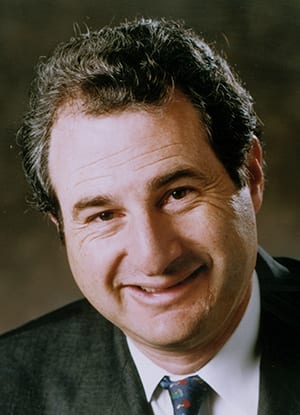
Unemployment is at its lowest rate in 50 years, there are almost 7 million job openings nationwide, and consumer confidence is at its highest level in a decade. There’s more venture capital flowing than at any point since 2000, and commercial real estate loan origination is at its highest point ever. So, what could go wrong?
Lots, said Kenneth Rosen, faculty director for the Haas School’s Fisher Center for Real Estate & Urban Economics, who foresees a recession within the next 18 to 24 months.
“We’ve had a sugar high for the economy, and it will wear off,” said Rosen, delivering his annual forecast at the 41st Annual Real Estate & Economics Symposium in San Francisco this week. “We’re in the last stages of a very good recovery, but we’re buying this time by spending a lot of money that we don’t have.”

Even so, Rosen does not foresee a crash in the real estate market anything like 2004 to 2007 or the late 1980s, and there’s still plenty of “dry powder”—or cash available for investment, he said. While real estate is overvalued compared to historical prices, it’s not overvalued compared to everything else, he said.
“This is not a very dramatic forecast, but the risks have risen dramatically and this is just the beginning of volatility,” he said. “There will be correction, and the Bay Area is likely to have a bigger correction than the rest of the country, because we’ve gone up so much.”
“A sledgehammer to break open a walnut”
Rosen pointed to rising interest rates, a ballooning national deficit, increasingly restrictive immigration policies in a tight labor market, and the escalating trade war with China as trouble signs. With $250 billion in tariffs imposed and $257 billion more threatened by President Trump, Chinese retaliation is to be expected.
“We certainly have problems with China, but tariffs are an exceptionally a blunt tool. It’s like using a sledgehammer to break open a walnut,” said Rosen, who is also chairman Rosen Consulting Group, a real estate market research firm. “No one wins in a trade war.”
The combined economic stimulus of tax cuts and increased spending has overheated the economy, and left few tools in policy makers’ arsenal to recover from the next recession, he said. A gridlocked Congress would not be able to pass a spending increase bill, or another tax cut. “In a full employment economy, the deficit should be zero or positive, so we should be at a balanced budget today. We’re doing the opposite. We’re not going to be ready for the next big downturn.”
While he had plenty of critiques of President Trump and his administration, he said Congress is also at fault. “There are no fiscal hawks any more. There’s no one who believes in balanced budgets.”
Red-hot economy
In the immediate future, however, the economy remains red hot. There’s a boom in job creation nationwide, especially throughout the West. California as a whole is a bit lower than the rest of the region, but it still had 1.9 percent growth in job creation year-over-year. Unemployment in San Francisco hovers just over 2 percent.
“The tech cities are going strong: Seattle, Austin, Silicon Valley, Denver, San Francisco, and Oakland are still very strong. The only thing constraining these places is the fact that housing is so expensive that they can’t get people to come. We’d be growing faster if we can solve some of those issues.”
Real estate forecast
Nationwide, retail is still struggling while industrial properties are hot, with vacancy rates at their lowest point since the 80s. “It’s a red-hot sector because of e-commerce, which is driving the demand for this space and bypassing retail network.”
In terms of commercial real estate, Rosen predicts cap rates—or the rates of return on commercial property—are expected to rise after historic lows. He warned the crowd of 300 real estate and finance professionals in the room to not be too smug. “We’ve had big periods of appreciation in the last decade because cap rates went down. Don’t think it’s because you’re smart—it’s because they repressed interest rates. It’s going to reverse. We’ll have headwinds.”
His advice? “As a lender, I’d say now’s the time to be cautious. Don’t lend to inexperienced people. You’ve got to be able to hold through the next six years—don’t think you’re going to miss this recession,” he said. “As an investor, it’s now is the time harvest or hedge, don’t wait for the next cycle.”
Nationally there’s strong demand for office space, but it’s nothing like previous booms. And vacancy rates have stopped going down because businesses need less space per worker—thanks to open floor plans and co-working spaces.
“The WeWorks of the world are 50 percent more dense than traditional office spaces,” he said.
Although the rental market peaked several years ago and home ownership is creeping back up, rental vacancy rates are low. The proportion of young adults living with their parents has begun to drop from a high of 32 percent in 2016. In the Bay Area, apartment vacancy rates are below 4 percent, and rents are rising again after appearing to top out.
California—a victim of its own success?
California homes have become increasingly unaffordable–just 30 percent of people can afford a median priced home, compared with 50 percent nationally. In the Bay Area, prices were up almost 10 percent year-over-year in September. Recently, however, there are signs that home prices may be beginning to drop—whether it’s due to rising interest rates or people leaving the region.
All this leads Rosen to believe California may soon be a victim of its own success.
“We may be the cause of our own demise. With high housing prices and congestion, people are going to move elsewhere,” he said. “You’ve seen reports that up to a third of people are thinking of relocating in the next five years. Add to that the higher taxes that we keep on voting on ourselves, and I think we could be in a situation where we’ve hit our peak moment and it’s just a question of how fast we can slow down.”